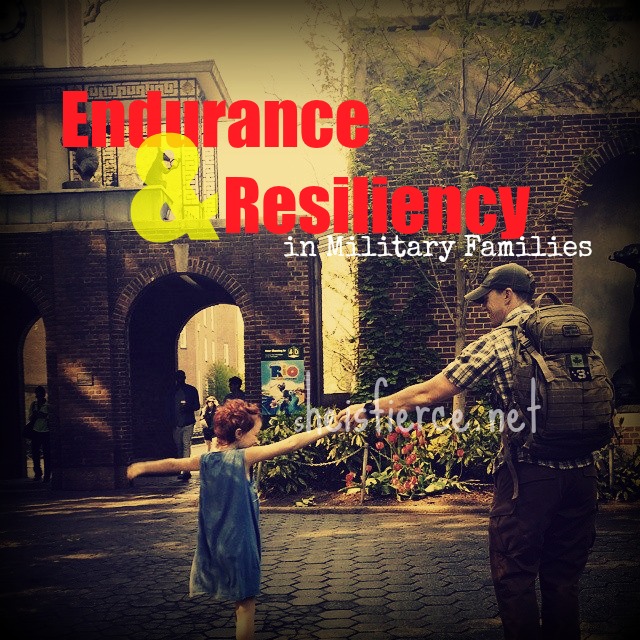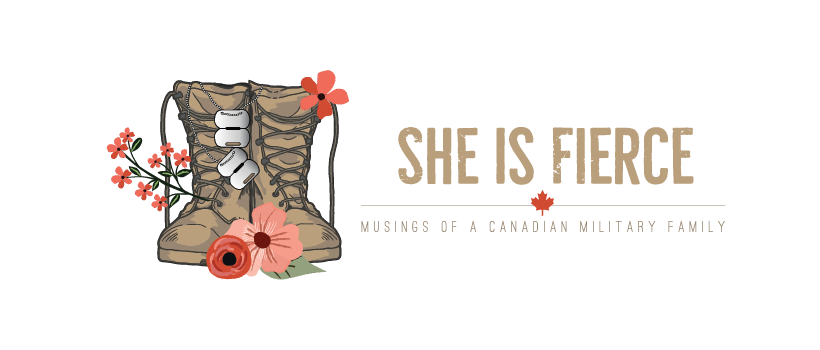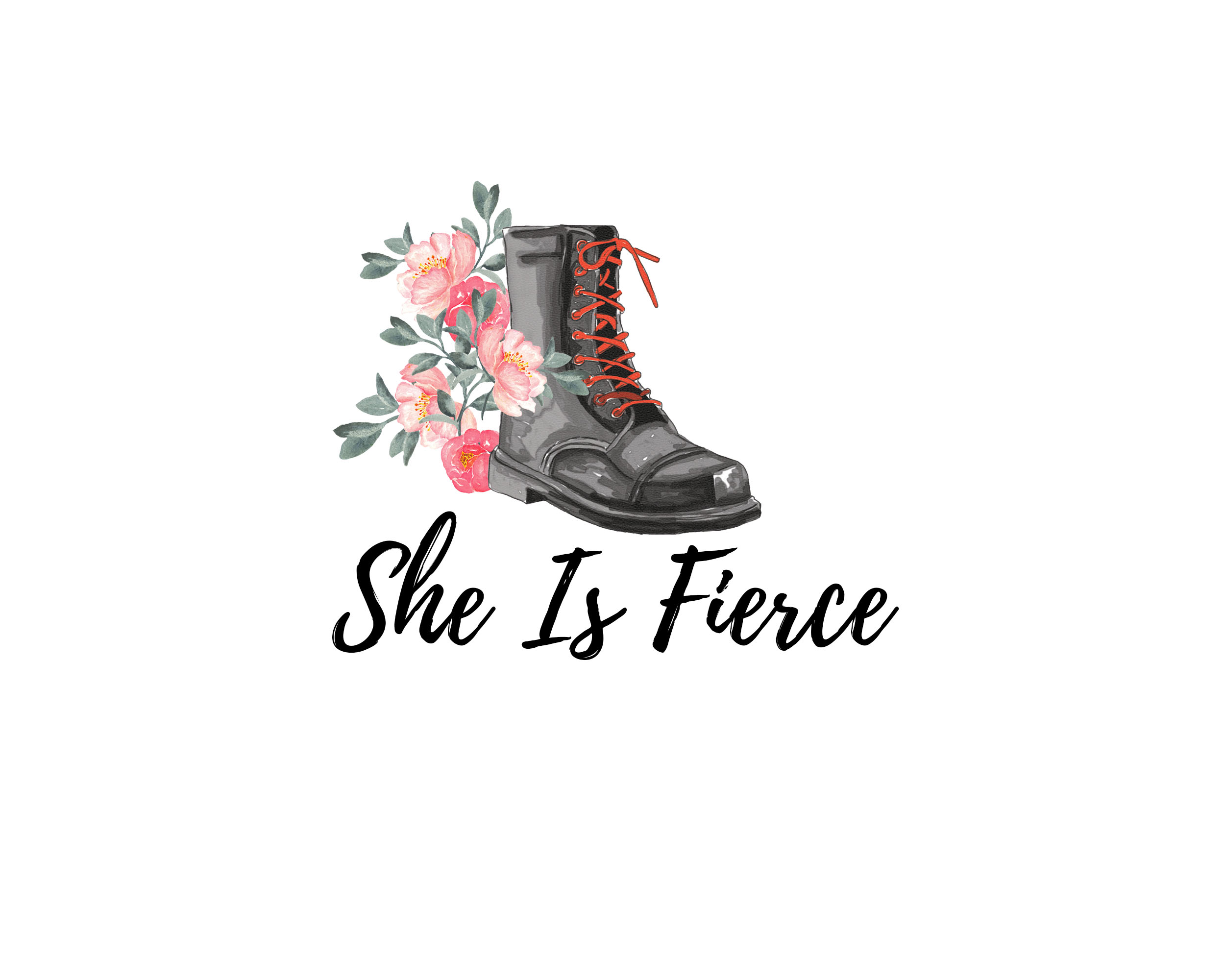Endurance and Resiliency: Stop teaching military families to endure

The following is a loose transcript of the 2nd half of my key note speech at this year’s Military Family Services conference. I’m so grateful for the opportunity I had to share at the conference and hope that it was even a little successful in what I set out to do, which was only share a story in the hopes it would get people thinking. I’m just one family and have only my own voice. Thanks so much for letting it be heard.
 After sharing my story, I think it’s important that we first understand that I am coming from just one family. We are not special; there are thousands just like us out there. But we all come from slightly different perspectives. The Canadian Forces has many different trades, jobs and postings that will all lend itself to very different experiences. Each military unit has its own unique culture. And each family within it, their own story. Blended families. Dual services families. Same sex partnerships, families with or without children. We can run the gamut of religious, political and social diversity.
After sharing my story, I think it’s important that we first understand that I am coming from just one family. We are not special; there are thousands just like us out there. But we all come from slightly different perspectives. The Canadian Forces has many different trades, jobs and postings that will all lend itself to very different experiences. Each military unit has its own unique culture. And each family within it, their own story. Blended families. Dual services families. Same sex partnerships, families with or without children. We can run the gamut of religious, political and social diversity.
Looking at us all, what then is our goal? Are we looking for temporary fixes or long term resiliency? Are we giving tools or band aids?
If we are, in fact, trying to teach families resiliency, how do we do that? Well, I can say that in our story, I know what didn’t work.
There were times that I received more services than others. One deployment, I even received help from the Regiment by the way of a driver to take me to appointments that I was unable to drive to for medical reasons. Which was amazing, and needed at the time as we were new and I hadn’t met a soul that I could ask. But I did learn something from that.
- No matter how far away or how little communication your husband has, if you live on base and another soldier is regularly seen picking you up and dropping you off, he will hear about it.
- I was still lonely.
It was great that the service was available when I needed it, but it didn’t teach me any long term solutions. I would still stay up as late as I could every single night because nighttime TV was better than daytime TV so if I was up to 3 watching reruns of MASH, I wasn’t stuck at 9 trying to keep myself busy with daytime talk shows. I was still terribly lonely.
So what isn’t resiliency?
- Resiliency is not free gifts. It has taken me quite a bit of time to accept that gifts are the way some people want to show their gratitude, and graciously accepting those gifts is the kind thing to do. But they don’t teach me how to manage months alone or help me long term. While they can be useful as a short term means of self care, they can lead to dependence and, in some case, entitlement, while offering little in the way of long term lessons on management and support. Free gifts for my kids at a Christmas party are a wonderful treat, but won’t give me the skills to manage the season on my own.
- Resiliency is not free services. Sometimes, especially in cases of emergencies or exhausted resources, things like free respite care are needed. But while 100% required by many, it is still a band-aid solution that should be used as such – when needed and as necessary. It should not be a long term solution to the needs of our community.
- Resiliency is not a crisis management model. We don’t teach families to be resilient by waiting until the come to us after they’ve exhausted all their reserves. We aren’t giving long term hope and skill by holding off offering services until the need has reached emergent levels and either the member needs to return home or we need to offer emergency care. Crisis care is of course needed. But it is just that, for crisis. Crisis care is not part of a strategy to teach resiliency.
And none of this is to negate these programs. As I’ve tried to stress, these are needed and families can find themselves in a variety of situations where they need crisis management or free emergency or respite childcare. And Christmas parties, gifts and discounts are a lovely bonus, especially for a weary family. But if the primary focus of our services is to give families the strategies they need to be able to form long term resiliency, they are not meeting that goal.
So what IS resiliency?
- Resiliency is empowerment. We are not helpless. We do, however, need help with the ‘how’. We need help with training, help with communicating within our community. We need help to see our own potential and that of our ideas, and the encouragement to move forward with them.
- Resiliency is admitting when we need help. Remind us that it’s okay to fall down. Life is messy. Military life is messy. We need the tools to recognise our own limitations so we can plan for our needs and avoid a crisis. Help us see the benefit of seeking help before the collapse.
- Resiliency is community. We are what we need, but we need to seek it out. It’s not always going to be found at the MFRC. It might be found in a place of worship, a community group, a parenting group, a sports team. We need that extra push that we need to either find our community or make it ourselves.
More than anything, stop teaching us to endure. Our life isn’t a hardship in itself. Stop teaching us that the best we can do is ‘put up with it.‘ For some of us, that might be ‘putting up with‘ 30 years of our lives. No wonder we are always tired when we can only hope for a lifetime of enduring. Instead of teaching us to spend our lives just barely coping, teach us to spend it enjoying!
If you followed along on my blog this past year, you would have seen our Deployment Project. This was an idea that followed that of author Sarah Smiley. What it means was, as soon as my husband left on his 4th deployment, we decided that instead of just accepting the deployment and focus on just enduring the next year, we could find ways to enjoy as many parts of it as possible. And one way we found to do that was to take the opportunity to invite different members of our community for dinner. We hosted neighbours, police officers, an MMA fighter, an Army General, our MP, MLA and our Mayor, radio hosts, an environmental engineer, an international family, a family of a different culture than our own, among many others!
What did we gain? Excitement. Experience. Friendship. One of our guests showed up at my son’s birthday party. Whenever my kids would hear the radio host on, they would point out ‘their friend’ on the radio. When I pinned my husband’s medal on his chest on his return, the General who handed it to me had that Christmas made a gingerbread house with my kids.
We gained a community.
Not everyone will find their enjoyment this way, but everyone has a way. It might be in running, or fitness. In going back to school or taking a class. In experiences like Family Days or even things like getting to have pancakes for dinner say…. 3 times a week. It could be taking every impulsive scenic route when you travel because your spouse isn’t there to wonder why.
Resiliency is finding ‘insteads’.
Your ‘instead’ doesn’t have to be ‘the same’. It doesn’t even need to compare. Of COURSE you’d give up an experience in order to have your spouse home, maybe you’d give it up to get to stay at one posting. But you can’t. There is no ‘rather’. There’s only ‘instead’.
Last Christmas my husband was deployed. And our ‘instead‘ was to take the chance, without any family obligations nearby, to drive the kids and I to Manhattan. Because without our hero home, we decided to spend Christmas morning in the city of Superheros. And that morning we ran into 2 NYPD officers. My youngest collects cop`s autographs, and while we talked to these officers, we realised they we wearing 9/11 pins. And there, at 8am Christmas morning on 5th avenue in Manhattan, we clinked coffee cups with 2 real life heroes as we all silently realised how our lives connected. That was a moment I treasure, and an experience I had because my husband couldn’t be there. It doesn’t have to be a matter of how I’d rather it was, it’s enjoying every moment we got instead.
We have a choice. And it’s not always just to endure.
Yes, it’s hard. I’m not going to sugar coat it and say it’s not. We’ve seen 4 overseas deployment and numerous domestic ones. My anxiety post-Afghanistan can be hard to shake. Even in his down time, Dh is gone often more than he’s home. Our last reintegration was very, very difficult. Life with a combat solider can be heartbreaking, terrifying and nerve-wracking. I had a completely irrational and unexpected reaction to watching my husband get shot in paintball that I can’t shake. IR almost broke us. I’m again unemployed because of a move.
This past deployment when a friend showed up at our door in DEUs when I was at work, my son told his siblings to stay downstairs when he saw him because `I thought he was there to tell us Dad was dead.` There’s no getting around that it can be so, so hard. And I’ve had so many bad days, months, years. I’ve dealt with things poorly and I’ve fallen down and it’s been at times very, very messy.
But it can be more than it’s low points. It has to be more, or we are never going to find it in us to keep going.
Who, then, is responsible for our resiliency?
It can’t be Command teams, they change. So do policies, bases, and we all know funding is not consistent. We can’t rely on a military system and public opinion controlled by the politics and conflicts of the day to provide our resiliency for us.
Earlier I spoke of a young Lieutenant. He had told me he felt no pride and no challenge to be his best because he saw no reason to. The system, the command, the policies, they didn’t give him what he was looking for.
But as I spoke to him all I could picture was a funeral I had recently been to for a member of the unit who had lost his battle with PTSD. We drove 6 hours to be there because regardless of how much I love my husband and he loves me, I couldn’t give him what his other family could. I couldn’t be his brothers. Those weeks, they called each other to check in. Even if it was just to say ‘I just need to hear you say you’re good because I can’t do this again.’ They loved each other. They took care of each other, followed up with each other, sought support for each other. Regardless of what their Regiment, their Chain of Command or the Forces did, they made resiliency happen among themselves.
That’s where the lasting change is found. The Lieutenant was looking for someone to make his community for him because he was unwilling to see it where it was. He was giving someone else responsibility for his own resiliency instead of building it himself. Resiliency isn’t in another free movie night. It’s not in seeking those free gifts. It’s not even in the free childcare. Lasting change will be when we recognize that resiliency is people willing to find the ‘instead.’ People who choose to ‘enjoy’ instead of endure. People who know when and how to offer support and even more importantly, people who know there’s no shame in admitting when they need it themselves. People who connect with others and enter their communities not to be served but to serve.
Challenge us. Challenge us to live our lives and not be content to just endure them.
Empower us to serve each other.
Put the responsibility for our own resiliency back on our own shoulders, and then give us the tools we need to build it into something that lasts.
Comments
About The Author
reccewife
Comments
Related posts:
Related Posts
How to move with the military in 54 easy steps
For those of you with a military move on the horizon, here’s 54…
Comments
Related posts:
Our military community, friends and sisters
Occasionally when I look around at Dh’s comrades when they are out…








Kate Horrell | 2nd Oct 15
So true, and so important. I typically bristle at anything that has the word “resiliency” involved, because it is so often used to describe things that don’t have anything to do with building resiliency. Thank you for highlighting the problem and suggesting real things that can be done.
Heather | 7th Oct 15
I’ve never thought of enduring as a negative thing, but when you compare it to “enjoying life” for what it is I can see how it does shed a perspective of just getting by. You’re totally right, it is tiring! When you describe giving tools to help build that community I pictured a coach, someone who takes the time to check in, assess, motivate, and encourage their efforts. Great piece!
Brian Forbes Colgate | 9th Feb 16
You have written so well (once more) about something common to military, retired/former military, and civilian families alike. Thank you!
Endurance is Thoreau’s “resignation”
“The mass of men lead lives of quet desperation. What is called resignation is confirmed desperation.”
~ Henry David Thoreau, “Walden”
“Alas for those that never sing,
But die with all their music in them.”
~ Oliver Wendell Holmes, “The Voiceless”